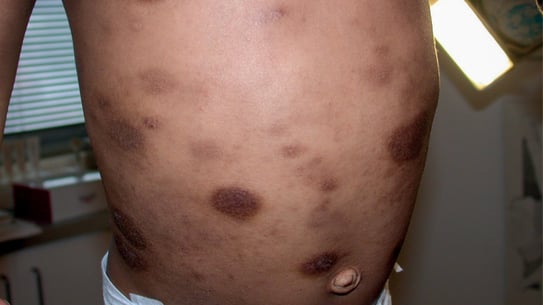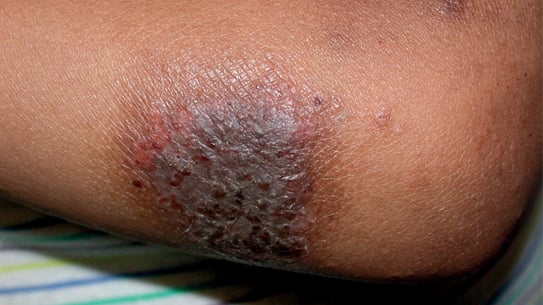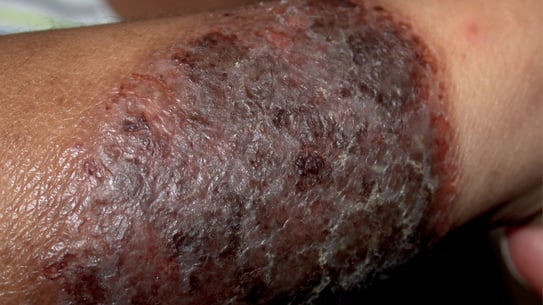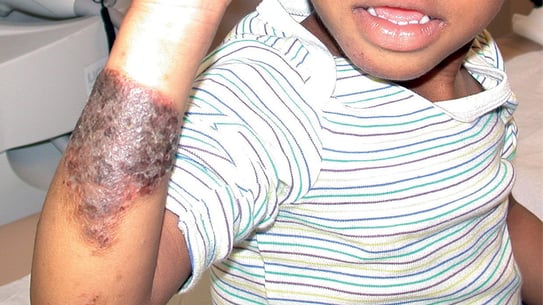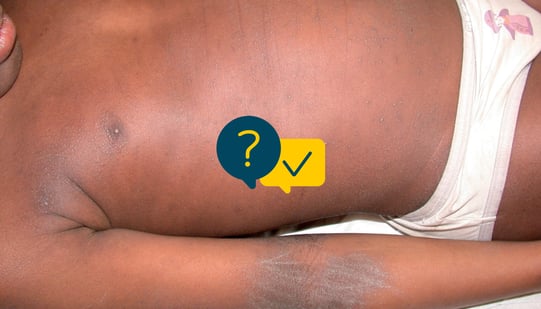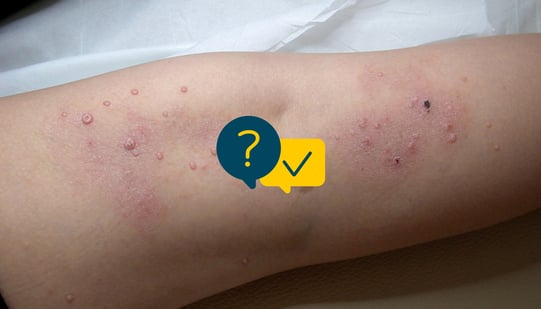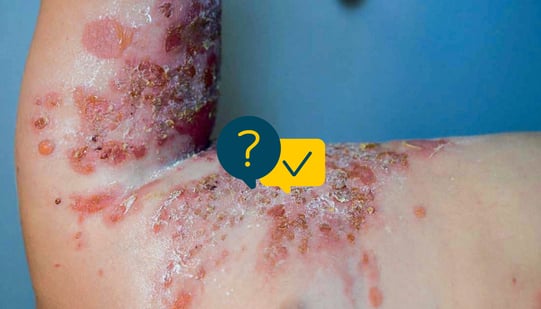Marvin, 7 and a half years old, Hyperpigmentation unlike others
Written with the participation of FDVF (Future Dermatologists and Venereologists of France) interns.
Related topics
- Dryness / Atopy / Eczema
- 7½ -year-old child of Caribbean origin
- Inflammatory erythematosquamous dermatosis with hyperpigmentation
- Dry skin
- Pruritus with scratching lesions
- Family and friends: NTR
- No animals
- Family history of atopy
Quiz
40 respondents
Question of 1
What is your diagnosis? (only one correct response)
Atopic dermatitis
Atopic dermatitis
It is indeed atopic dermatitis.
Let’s rule out differential diagnoses:
- Contact Eczema:
Location related to an allergen, +- vesicular and + pruritic. + difficult when chronic or nummular.
- Mycosis (Ringworm):
Lesions with geographic edges, inflammatory at the edges, with scarring at the centre, centrifugal, recent +- pruritic.
Animal contact and mycology if necessary.
Contact eczema
Wrong answer!
It was atopic dermatitis.
Let’s rule out differential diagnoses:
- Contact Eczema:
Location related to an allergen, +- vesicular and + pruritic. + difficult when chronic or nummular.
- Mycosis (Ringworm):
Lesions with geographic edges, inflammatory at the edges, with scarring at the centre, centrifugal, recent +- pruritic.
Animal contact and mycology if necessary.
Mycosis
Wrong answer!
It was atopic dermatitis.
Let’s rule out differential diagnoses:
- Contact Eczema:
Location related to an allergen, +- vesicular and + pruritic. + difficult when chronic or nummular.
- Mycosis (Ringworm):
Lesions with geographic edges, inflammatory at the edges, with scarring at the centre, centrifugal, recent +- pruritic.
Animal contact and mycology if necessary.
- Presence of pruritus: Yes
- Onset: before the age of 2
- Progression: in flare-ups with periods of remission
- Xerosis: +- generalised
- Lesions: The patient has jagged eczema lesions and scratching lesions
- History: The patient has a family history of atopy
- Other elements: Hyperpigmentation is due to inflammation on black skin
No additional examinations to be performed in general. The diagnosis is clinical
Allergy tests are only indicated if there is an associated disease: asthma, rhinitis, or suspected food allergy or contact eczema.
Dermatological treatment:
Topical corticosteroids can be prescribed as first-line therapy. What is dangerous is steroid phobia!
In short: low-potency class such as desonide (Tridesonit®)
- Initial treatment: Once a day with no maximum amount, should be started early and continued until clearing.
- Maintenance treatment:
- Either once or twice a week if flare-ups are frequent
- Or discontinue topical corticosteroids and resume from the first signs of relapse if flare-ups are less frequent.
Dermo-cosmetic support:
Use of emollients: at least once a day – that is the basic principle behind maintenance treatment for AD! Moisturises, reduces micro-inflammation and pruritus, regulates the microbiome, eliminates the need for cortisone.
PARENT EDUCATION:
- Steroid phobia
- Hygiene
- Cleanse with warm water without soap
- Avoid wool and synthetic textiles: favour cotton
- Avoid tobacco
- Adopt scratching avoidance strategies
- Normal vaccination schedule
Create easily your professional account
I create my account-
Access exclusive business services unlimited
-
Access valuable features : audio listening & tools sharing with your patients
-
Access more than 150 product sheets, dedicated to professionals
